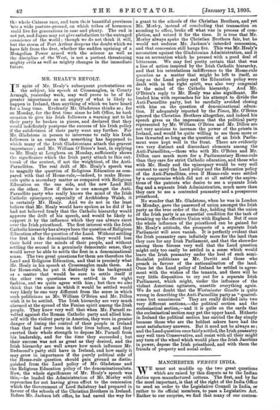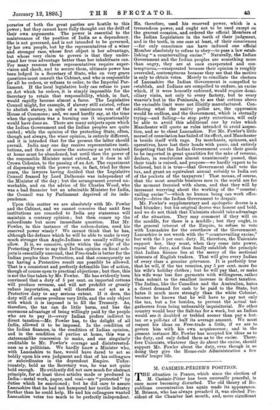MANCHESTER VERSUS INDIA.
WE must not muddle up the two great questions which are raised by this dispute as to the Indian duties upon manufactured cottons. The first, and by far the most important, is that of the right of the India Office to send an order to the Legislative Council in India, or rather to its official members, to pass a Legislative Act. Rather to our surprise, we find that many of our contem- poraries of both the great parties are hostile to this power ; but they cannot have fully thought out the drift of their own arguments. The power is essential to the maintenance of the position of India as a dependency. She is not governed, and is not intended to be governed, by her own people, but by the representatives of a wiser and stronger race, whose first object is her advantage, but whose very claim to govern is that they under- stand her true advantage better than her inhabitants can. For many reasons these representatives require super- vision and check, and to secure them, ultimate power has been lodged in a Secretary of State, who on very grave questions must consult the Cabinet, and who is responsible for all he orders, or refuses to order, to the Imperial Par- liament. If the local legislative body can refuse to pass an Act which he orders, it is simply impossible for the Secretary to retain that responsibility, which, in fact, would rapidly become almost a farce. The Legislative Council might, for example, if slavery still existed, refuse to abolish slavery, in spite of a unanimous vote of the House of Commons ; and, we need hardly say, at the time when the question was a burning one it unquestionably would have done so. There are many subjects upon which the Indian Government and the Indian peoples are quite united ; while the opinion of the protecting State, often, though not always, the wiser opinion, is entirely different, and it is intended that for the present the latter should prevail. India may one day receive representative insti- tutions, and then of course the autocracy as yet retained at home must be abandoned, but until then the power of the responsible Minister must extend, as it does in all Crown Colonies, to the passing of an Act. The experiment of dispensing with the power was, in fact, tried for three years, the lawyers having decided that the Legislative Council framed by Lord Dalhousie was independent of the Minister of the day ; but the arrangement proved un- workable, and on the advice of Sir Charles Wood, who was a bad financier but an admirable Minister for India, the Council was by Parliament deprived of its inde- pendence.
Upon this matter we are absolutely with Mr. Fowler and the Cabinet, and we cannot conceive that until free institutions are conceded to India any statesman will maintain a contrary opinion ; but then comes up the subordinate but more immediate question. Has Mr. Fowler, in this instance of the cotton-duties, used his reserved power wisely ? We cannot think that he has, although the defence which he will be able to make is very much stronger than Anglo-Indians are usually willing to allow. It is, we conceive, quite within the right of the Protecting Power to say that Indian opinion on fiscal sub- jects is essentially unsound, that Free-trade is better for the Indian peoples than Protection, and that consequently no tax having a Protective result can possibly be allowed. That is a consistent and perfectly defensible line of action, though of course open to practical objections ; but then, this is not the line taken by Mr. Fowler. He has evidently been convinced that a duty of 5 per cent, on imported cottons will produce revenue, and will not prohibit or greatly reduce importation, and will therefore not act as a Protective duty to any serious extent. If it does, the duty will of course produce very little, and the only object with which it is imposed is to fill the Treasury. As, therefore, the tax can do little harm, and has the enormous advantage of being willingly paid by the people who are to pay it—every Indian prefers indirect to direct taxation—Mr. Fowler has, to the delight of all India, allowed it to be imposed. In the condition of the Indian finances, in the condition of Indian opinion, and in the condition of parties at home, this was a atatesmanlike concession to make, and one singularly creditable to Mr. Fowler's courage and disinterested- ness as a politician. We hardly know a Minister who, with Lancashire to face, would have dared to act so boldly upon his own judgment and that of his colleagues or subordinates in the dependent Empire. Unfor- tunately, bold as the Secretary was, he was not quite bold enough. He evidently did not care much for abstract principle, for at least three articles made or produced in India—metal work, paper, and coal—are "protected" by duties which he sanctioned ; but he did care to assure Lancashire that he had not hampered her textile industry further than he could help. He and his colleagues wanted Lancashire votes too much to be perfectly independent. He, therefore, used his reserved power, which is a tremendous power, and ought not to be used except on the gravest occasion, and ordered the official Members of the Indian Legislature in the teeth of their judgment, and in the teeth, in one case at least, of their consciences —for only conscience can have induced one official Member absolutely to refuse to obey—to pass a law estab- lishing "a countervailing excise." Naturally, the Indian Government and the Indian peoples are something more than angry, they are at once exasperated and con- temptuous,—exasperated because their opinion is roughly overruled, contemptuous because they see that the motive is only to obtain votes. Merely to conciliate the electors of Lancashire the Indian Government is compelled to establish, and Indians are compelled to endure, an excise which, if it were honestly enforced, would require domi- ciliary visits, not only to every factory, but to every weaver's hut in the Peninsula, to see that cottons above the excisable limit were not illicitly manufactured. Con- sidering what the native police are, the oppression would be endless, and the Government, which is eternally trying—and failing—to stop petty extortions, will only be able to avoid this additional one by rules which Manchester will quote as rules intended to avoid 'aaspec- tion, and so to cheat Lancashire. For Mr. Fowler's little morsel of consolation has failed of its effect, and Manchester is beside itself with rage. Its merchants, spinners, and operatives, have lost their heads with panic, and entirely forgetting that the Indian Government wants their goods to be imported in great quantities for the sake of revenue, declare, in resolutions almost unanimously passed, that their trade is ruined, and propose—we hardly expect to be believed, but it is true—that Government shall veto the tax, and grant an equivalent annual subsidy to India out of the pockets of the taxpayers ! That means, of course, that the most sensible business men in the world are for the moment frenzied with alarm, and that they will by incessant worrying about the working of the "counter- vailing excise "—which no human being can work effec- tively—drive the Indian Government to despair.
Mr. Fowler's supplementary and apologetic decree is a bad blunder ; but his original decree was honest and bold, and we do not think that Unionists should take advantage of the situation. They may comment if they will on the muddle, for there is a muddle ; but they ought, in the general interest of the Empire, to refuse to vote with Lancashire for the overthrow of the Government. Lancashire is not wroth with the "countervailing excise," but with the 5 per cent. duty. If, therefore, the Unionists support her, they must, when tleey come into power, repeal the duty, and thus finally establish the principle that Indian finance lies at the mercy of the sectional interests of English traders. That will give every Indian of every class a genuine grievance. It is perfectly true that he will, if the tax remains, pay 5 per cent. more for his wife's holiday clothes ; but he will pay that, or make his wife wear less fine garments with willingness, rather than submit to the smallest increase in direct taxation. The Indian, like the Canadian and the Australian, hates a direct demand for cash to be paid to the State, but hates it much more strongly than the white Colonist. because he knows that he will have to pay not only the tax, but a fee besides, to prevent the actual tax- gatherers from being unbearably inquisitorial. No other country would bear the Salt-tax for a week, but an Indian would see it doubled or trebled sooner than pay a hut- tax or a poll-tax of half its average amount. We must respect his ideas on Free-trade a little, if we are to govern him with his own acquiescence ; and in the present instance Mr. Fowler has accepted his ideas as to the duty, and only defied them as to the excise. There- fore Unionists, whatever they do about the excise, should support Mr. Fowler about the duty, even though in so doing they give the Home-rule Administration a, few weeks' longer life.



































 Previous page
Previous page